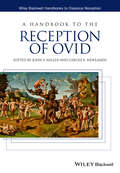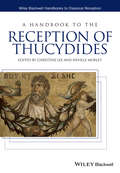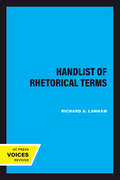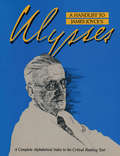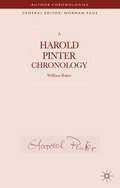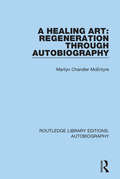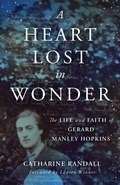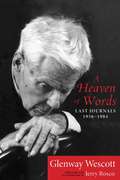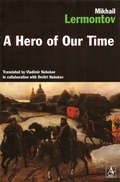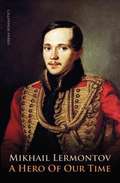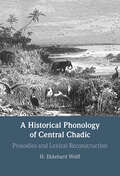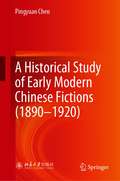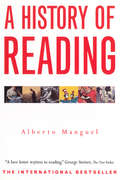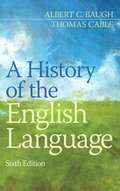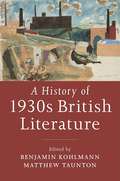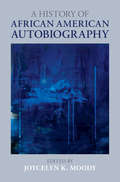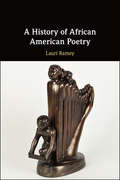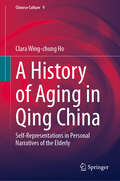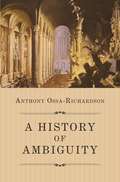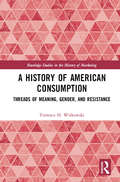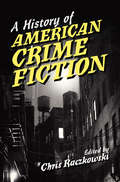- Table View
- List View
A Handbook to the Reception of Ovid (Wiley Blackwell Handbooks to Classical Reception)
by Carole E. Newlands John F. MillerA Handbook to the Reception of Ovid presents more than 30 original essays written by leading scholars revealing the rich diversity of critical engagement with Ovid’s poetry that spans the Western tradition from antiquity to the present day. Offers innovative perspectives on Ovid’s poetry and its reception from antiquity to the present day Features contributions from more than 30 leading scholars in the Humanities. Introduces familiar and unfamiliar figures in the history of Ovidian reception. Demonstrates the enduring and transformative power of Ovid’s poetry into modern times.
A Handbook to the Reception of Thucydides (Wiley Blackwell Handbooks to Classical Reception)
by Christine LeeA Handbook to the Reception of Thucydides offers an invaluable guide to the reception of Thucydides, with a strong emphasis on comparing and contrasting different traditions of reading and interpretation. • Presents an in-depth, comprehensive overview of the reception of the Greek historian Thucydides • Features personal reflections by eminent scholars on the significance and perennial importance of Thucydides’ work • Features an internationally renowned cast of contributors, including established academics as well as new voices in the field
A Handlist of Rhetorical Terms
by Richard A. LanhamWith a unique combination of alphabetical and descriptive lists, A Handlist of Rhetorical Terms provides in one convenient, accessible volume all the rhetorical terms—mostly Greek and Latin—that students of Western literature and rhetoric are likely to come across in their reading or will find useful in their writing. The Second Edition of this widely used work offers new features that will make it even more useful:* A completely revised alphabetical listing that defines nearly 1,000 terms used by scholars of formal rhetoric from classical Greece to the present day* A revised system of cross-references between terms* Many new examples and new, extended entries for central terms* A revised Terms-by-Type listing to identify unknown terms* A new typographical design for easier access
A Handlist to James Joyce's Ulysses: A Complete Alphabetical Index to the Critical Reading Text
by Hans Walter Gabler Wolfhard SteppeFirst published in 1986, this book provides a handlist to James Joyce’s Ulysses, or a complete alphabetical index to the critical reading text, that is, the text on the right-hand pages in the critical edition of 1984 and all its future reprintings. The list is an unedited compilation to meet immediate needs of orientation for the new original text of Ulysses.
A Harold Pinter Chronology
by William BakerThe most detailed chronological account of Harold Pinter to appear, this new volume in the Author Chronologies series traces the daily activities of the Nobel Prize winning author. It is based upon published and unpublished materials, and discussion with his close friends, and is a basic reference tool for all Pinter students and scholars.
A Healing Art: Regeneration Through Autobiography (Routledge Library Editions: Autobiography #5)
by Marilyn Chandler McEntyreOriginally published in 1990. Many post-World War I autobiographies focus on episodes of crisis. In a century torn by global strife and breakdown of cultural institutions, autobiography provides a way of recovering from crisis and restructuring reality–a healing act that involves the writer in a "wrestle with words and meanings" that can be deeply regenerative. Narration can be a way of purging guilt and pain, re-centering the self, and reconnecting with community after a shattering experience has driven one into silence and isolation. This book considers the problems, such as finding words for the inexplicable, the narrative perspective chosen and the traditional forms or narrative structures as means of re-patterning consciousness. It looks at seven autobiographies as crisis narratives and demonstrates how therapy and art merge in autobiography so that the literature acts back upon life. Works considered: Vera Brittain’s Testament of Youth; Elie Wiesel’s Night; Christa Wolf’s Kinheitsmuster (A Model Childhood); C. S. Lewis’ A Grief Observed; Peter Handke’s Wunschloses Unglueck (A Sorrow Beyond Dreams); Adrienne Rich’s Of Woman Born; Robert Prisig’s Zen and the Art of Motorcycle Maintenance.
A Heart Lost in Wonder: The Life and Faith of Gerard Manley Hopkins (Library of Religious Biography (LRB))
by Catharine RandallGerard Manley Hopkins, one of the most beloved English-language poets of all time, lived a life charged with religious drama and vision. The product of a High-Church Anglican family, Hopkins eventually converted to Roman Catholicism and became a priest—after which he stopped writing poetry for many years and became completely estranged from his Protestant family.A Heart Lost in Wonder provides perspective on the life and work of Gerard Manley Hopkins through both religious and literary interpretation. Catharine Randall tells the story of Hopkins&’s intense, charged, and troubled life, and along the way shows readers the riches of religious insight he packed into his poetry. By exploring the poet&’s inner life and the Victorian world in which he lived, Randall helps readers to understand better the context and vision of his astonishing and enduring work.
A Heaven of Words
by Glenway WescottCharm, wit, compassion, wisdom, literature, nature, sex, humor, politics, sorrow, love: these themes fill the late journal pages of enigmatic American writer Glenway Wescott. From humble beginnings on a poor Wisconsin farm, Wescott went on to study at the University of Chicago, narrowly survive the Spanish flu pandemic, and eventually emerge as an influential poet and novelist. A major figure in the American literary expatriate community in Paris during the 1920s and a prominent American novelist in the years leading up to World War II, he spent a decade living abroad before relocating permanently to New York and New Jersey with his partner, Museum of Modern Art publications director and curator Monroe Wheeler. Together they mixed with such intellectual and creative greats as Jean Cocteau, Colette, George Platt Lynes, Paul Cadmus, Somerset Maugham, Christopher Isherwood, Marianne Moore, W. H. Auden, Truman Capote, Joseph Campbell, and scores of other luminaries. During the second half of his life, Wescott wrote nonfiction essays and worked for the Academy Institute of Arts and Letters, all the while keeping journals in which he recorded the experiences that fostered his love of life, literature, the arts, and humanity. A Heaven of Words looks back on Wescotts entire fascinating life and reveals the riveting narrative of his last decades.
A Hero Of Our Time
by Vladimir Nabokov Dmitri Nabokov Mikhail LermontovA brilliant new translation of a perennial favorite of Russian Literature The first major Russian novel, A Hero of Our Time was both lauded and reviled upon publication. Its dissipated hero, twenty-five-year-old Pechorin, is a beautiful and magnetic but nihilistic young army officer, bored by life and indifferent to his many sexual conquests. Chronicling his unforgettable adventures in the Caucasus involving brigands, smugglers, soldiers, rivals, and lovers, this classic tale of alienation influenced Tolstoy, Dostoyevsky, and Chekhov in Lermontov’s own century, and finds its modern-day counterparts in Anthony Burgess’s A Clockwork Orange, the novels of Chuck Palahniuk, and the films and plays of Neil LaBute.
A Hero Of Our Time
by Vladimir Nabokov Dmitri Nabokov Mikhail LermontovA brilliant new translation of a perennial favorite of Russian Literature The first major Russian novel, A Hero of Our Time was both lauded and reviled upon publication. Its dissipated hero, twenty-five-year-old Pechorin, is a beautiful and magnetic but nihilistic young army officer, bored by life and indifferent to his many sexual conquests. Chronicling his unforgettable adventures in the Caucasus involving brigands, smugglers, soldiers, rivals, and lovers, this classic tale of alienation influenced Tolstoy, Dostoyevsky, and Chekhov in Lermontov's own century, and finds its modern-day counterparts in Anthony Burgess's A Clockwork Orange, the novels of Chuck Palahniuk, and the films and plays of Neil LaBute.
A Hero of Our Time
by Mikhail Iurevich LermontovLermontov's only full-scale novel, which prophetically describes the duel in which he later lost his own life. <P> <P> The hero of the novel, Pechorin is an intense individual, a military officer who kidnaps beautiful daughter of Circassian tribesman and who, according to Lermantov's own introduction, is a composite portrait, made up of all the vices which flourish, full grown, amongst the generation of the time. A timeless classic representing nihilistic aspect of Romanticism. On July 25, 1841, at Pyatigorsk, fellow soldier Nikolai Martynov, who had been the butt of Lermontov's jokes, challenged Lermontov to a duel. The duel took place two days later at the foot of Mashuk mountain. Lermontov deliberately chose the edge of a precipice for the duel, so that if either combatant was wounded, he would fall and his fate would be sealed. Lermontov was killed by Martynov's first shot. Much of his best verse was posthumously discovered in his pocket-book. This edition is a new revision aiming to bring English translation as close as possible to Lermontov's original vision. There has been some confusion in various English editions containing entries of Pechorin's diary, not present in Lermontov's original and various other alterations of Lermnontov's original structure of the novel. This edition has been compiled after close examination of Russian originals and follows originally intended structure. This edition is part of a new series of Romantic writing, aiming to give readers a complete experience of both classic and contemporary Romantics.
A Historical Guide to Walt Whitman
by David S. ReynoldsPlaces the author and his thinking in its historical context. One of a series on well-known authors.
A Historical Phonology of Central Chadic: Prosodies and Lexical Reconstruction
by H. Ekkehard WolffOf all of the African language families, the Chadic languages belonging to the Afroasiatic macro-family are highly internally diverse due to a long history and various scenarios of language contact. This pioneering study explores the development of the sound systems of the 'Central Chadic' languages, a major branch of the Chadic family. Drawing on and comparing field data from about 60 different Central Chadic languages, H. Ekkehard Wolff unpacks the specific phonological principles that underpin the Chadic languages' diverse phonological evolution, arguing that their diversity results to no little extent from historical processes of 'prosodification' of reconstructable segments of the proto-language. The book offers meticulous historical analyses of some 60 words from Proto-Central Chadic, in up to 60 individual modern languages, including both consonants and vowels. Particular emphasis is on tracing the deep-rooted origin and impact of palatalisation and labialisation prosodies within a phonological system that, on its deepest level, recognises only one vowel phoneme */a/.
A Historical Study of Early Modern Chinese Fictions (1890—1920)
by Pingyuan ChenThis book contains a classic guide to historical study of early modern Chinese fiction from the late Qing Dynasty till early republican China. It does not merely study the new fiction writing in China, which was strongly influenced by the western fiction, but also draws a comparison between classical Chinese fiction and the early modern Chinese fiction. This book is an excellent reference in the study of early modern Chinese literature since it conveys a point of view to the readers with abundant and solid historical materials. At the heart of the book, it is the matter of a specific value in trans-cultural studies between the western world and China.
A Historiography of the Modern Social Sciences
by Roger E. Backhouse Philippe FontaineA Historiography of the Modern Social Sciences includes essays on the ways in which the histories of psychology, anthropology, sociology, economics, history and political science have been written since the Second World War. Bringing together chapters written by the leading historians of each discipline, the book establishes significant parallels and contrasts and makes the case for a comparative interdisciplinary historiography. This comparative approach helps explain historiographical developments on the basis of factors specific to individual disciplines and the social, political, and intellectual developments that go beyond individual disciplines. All historians, including historians of the different social sciences, encounter literatures with which they are not familiar. This book will provide a broader understanding of the different ways in which the history of the social sciences, and by extension intellectual history, is written.
A History Of Reading
by Alberto ManguelFrom clay tablets to CD-ROM, from book thieves to book burners, bibliophiles, book fools and saints, noted essayist Alberto Manguel follows the quirky and passionate 4,000-year-old history of the written work whose true hero is the reader. Photos & line drawings.
A History Of The English Language
by Thomas Cable Albert BaughComprehensive and balanced, this classic exploration of the history of the English language combines internal linguistic history and external cultural history—from the Middle Ages to the present. Students are encouraged to develop both an understanding of present-day English and an enlightened attitude toward questions affecting the language today.
A History of 1930s British Literature
by Benjamin Kohlmann Matthew TauntonThis History offers a new and comprehensive picture of 1930s British literature. The '30s have often been cast as a literary-historical anomaly, either as a 'low, dishonest decade', a doomed experiment in combining art and politics, or as a 'late modernist' afterthought to the intense period of artistic experimentation in the 1920s. By contrast, the contributors to this volume explore the contours of a 'long 1930s' by repositioning the decade and its characteristic concerns at the heart of twentieth-century literary history. This book expands the range of writers covered, moving beyond a narrow focus on towering canonical figures to draw in a more diverse cast of characters, in terms of race, gender, class, and forms of artistic expression. The book's four sections emphasize the decade's characteristic geographical and sexual identities; the new media landscapes and institutional settings its writers operated in; questions of commitment and autonomy; and British writing's international entanglements.
A History of African American Autobiography
by Joycelyn MoodyThis History explores innovations in African American autobiography since its inception, examining the literary and cultural history of Black self-representation amid life writing studies. By analyzing the different forms of autobiography, including pictorial and personal essays, editorials, oral histories, testimonials, diaries, personal and open letters, and even poetry performance media of autobiographies, this book extends the definition of African American autobiography, revealing how people of African descent have created and defined the Black self in diverse print cultures and literary genres since their arrival in the Americas. It illustrates ways African Americans use life writing and autobiography to address personal and collective Black experiences of identity, family, memory, fulfillment, racism and white supremacy. Individual chapters examine scrapbooks as a source of self-documentation, African American autobiography for children, readings of African American persona poems, mixed-race life writing after the Civil Rights Movement, and autobiographies by African American LGBTQ writers.
A History of African American Poetry
by Lauri RameyAfrican American poetry is as old as America itself, yet this touchstone of American identity is often overlooked. In this critical history of African American poetry, from its origins in the transatlantic slave trade, to present day hip-hop, Lauri Ramey traces African American poetry from slave songs to today's award-winning poets. Covering a wide range of styles and forms, canonical figures like Phillis Wheatley (1753–1784) and Paul Laurence Dunbar (1872–1906) are brought side by side with lesser known poets who explored diverse paths of bold originality. Calling for a revised and expanded canon, Ramey shows how some poems were suppressed while others were lauded, while also examining the role of music, women, innovation, and art as political action in African American poetry. Conceiving of a new canon reveals the influential role of African American poetry in defining and reflecting the United States at all points in the nation's history.
A History of Aging in Qing China: Self-Representations in Personal Narratives of the Elderly (Chinese Culture #9)
by Clara Wing-chung HoThis book examines the history of aging and old age during the Qing dynasty, a pivotal period marked by rapid population growth that resulted in the largest elderly population in imperial China. Drawing on previously overlooked first-person accounts from the extensive collections authored by Qing men and women, it offers an overview of the self-curated collective aging journeys of several hundreds of elders. By centering the voices of individuals reflecting on their aging experiences, this book delves into the personal narratives from both genders, rediscovering their aging journeys, revealing their subjectively constructed emotional landscapes, and giving a voice to the elderly individuals of the past. The chapters closely analyze how the elderly in Qing China articulated their aging process, channeling their joys, challenges, and frustrations in later life. History is not the monopoly of a single gender, class, race, or age group; without representations of the elderly, history remains incomplete. This book seeks to restore the elderly to the historical narrative and invites further discussion on Chinese historical gerontology as an emerging subfield. In addition to appealing to general readers interested in contemporary demographic issues from a historical perspective, this book will engage students and researchers of history, historical gerontology, aging studies, gender studies, cultural studies, sociology, psychology, and Asian studies.
A History of Ambiguity
by Anthony Ossa-RichardsonEver since it was first published in 1930, William Empson’s Seven Types of Ambiguity has been perceived as a milestone in literary criticism—far from being an impediment to communication, ambiguity now seemed an index of poetic richness and expressive power. Little, however, has been written on the broader trajectory of Western thought about ambiguity before Empson; as a result, the nature of his innovation has been poorly understood.A History of Ambiguity remedies this omission. Starting with classical grammar and rhetoric, and moving on to moral theology, law, biblical exegesis, German philosophy, and literary criticism, Anthony Ossa-Richardson explores the many ways in which readers and theorists posited, denied, conceptualised, and argued over the existence of multiple meanings in texts between antiquity and the twentieth century. This process took on a variety of interconnected forms, from the Renaissance delight in the ‘elegance’ of ambiguities in Horace, through the extraordinary Catholic claim that Scripture could contain multiple literal—and not just allegorical—senses, to the theory of dramatic irony developed in the nineteenth century, a theory intertwined with discoveries of the double meanings in Greek tragedy. Such narratives are not merely of antiquarian interest: rather, they provide an insight into the foundations of modern criticism, revealing deep resonances between acts of interpretation in disparate eras and contexts. A History of Ambiguity lays bare the long tradition of efforts to liberate language, and even a poet’s intention, from the strictures of a single meaning.
A History of American Civil War Literature
by Hutchison ColemanThis book is the first omnibus history of the literature of the American Civil War, the deadliest conflict in US history. A History of American Civil War Literature examines the way in which the war has been remembered and rewritten over time in prose, poems, and other narratives. This history incorporates new directions in Civil War historiography and cultural studies while giving equal attention to writings from both northern and southern states. It redresses the traditional neglect of southern literary cultures by moving between the North and the South, thus finding a balance between Union and Confederate texts. Written by leading scholars in the field, this book works to redefine the boundaries of American Civil War literature while posing a fundamental question: why does this 150-year-old conflict continue to capture the American imagination?
A History of American Consumption: Threads of Meaning, Gender, and Resistance (Routledge Studies in the History of Marketing)
by Terrence H. WitkowskiThe United States has been near the forefront of global consumption trends since the 1700s, and for the past century and more, Americans have been the world’s foremost consuming people. Informed and inspired by the literature from consumer culture theory, as well as drawing from numerous studies in social and cultural history, A History of American Consumption tells the story of the American consumer experience from the colonial era to the present, in three cultural threads. These threads recount the assignment of meaning to possessions and consumption, the gendered ideology and allocation of consumption roles, and resistance through anti-consumption thought and action. Brief but scholarly, this book provides a thought provoking, introduction to the topic of American consumption history informed by research in consumer culture theory. By examining and explaining the core phenomenon of product consumption and its meaning in the changing lives of Americans over time, it provides a valuable contribution to the literature on the subjects of consumption and its causes and consequences. Readable and insightful, it will be of interest to scholars and advanced students in consumer behaviour, advertising, and marketing and business history.
A History of American Crime Fiction
by Chris RaczkowskiA History of American Crime Fiction places crime fiction within a context of aesthetic practices and experiments, intellectual concerns, and historical debates generally reserved for canonical literary history. Toward that end, the book is divided into sections that reflect the periods that commonly organize American literary history, with chapters highlighting crime fiction's reciprocal relationships with early American literature, romanticism, realism, modernism and postmodernism. It surveys everything from 17th-century execution sermons, the detective fiction of Harriet Spofford and T. S. Eliot's The Waste Land, to the films of David Lynch, HBO's The Sopranos, and the podcast Serial, while engaging a wide variety of critical methods. As a result, this book expands crime fiction's significance beyond the boundaries of popular genres and explores the symbiosis between crime fiction and canonical literature that sustains and energizes both.
